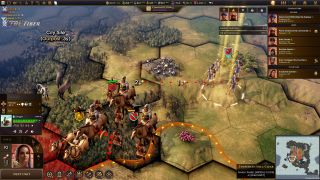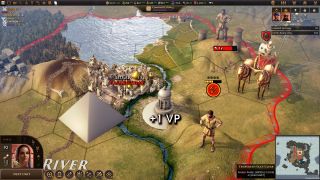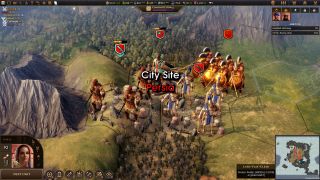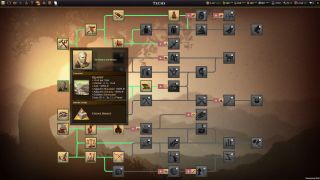Ancient history's wild stories play out in Old World, an ambitious strategy game from the designer of Civ 4
This new 4X may look like Civ, but it's adding in stories that highlight the personalities and true stories of your rulers.

Egypt played me for a sucker. I wanted to be friends, so the first time they came to me and said their gods didn't like me, I was happy to pay up to try to change their minds. But they kept coming back asking for bigger donations. That may sound like a repetitive AI doing the same thing over and over in a boring diplomacy system, but in hindsight I should've noticed that each time I was paying tribute to a different god, with different flavor text for each new request. I had unknowingly stepped into one of more than a thousand hand-authored event chains which add narrative flavor to Old World, a new 4X from Civ 4 designer Soren Johnson. When Egypt finished filling its pockets with my gold and declared war on me anyway, I really should've seen it coming.
"Why I like designing and working on Old World: I'm able to, as a writer, take historical events and turn them into mechanics [and make them] enjoyable," says Leyla Johnson. Before making games, Johnson had a career as a journalist and a US State Department employee, and she now fills multiple roles at Mohawk Games as president and one of the main event writers on Old World. The events system is what leads to sequential narratives like the one I ran into with Egypt—at first they seem like the sort of random happenings that often add variety to strategy games, but in Old World they're much more elaborate, mixing real history with the game's more systemic elements.
History is nuts
Leyla Johnson
"There's so much in history that can make our games colorful without us having to be super creative. History is nuts," Leyla says. "I'm taking whatever I can and trying to make mechanics that fit a game."
Leyla gives me an example: the story of Olga of Kiev, which is told wonderfully in the Something True podcast. Olga was a princess whose husband was murdered by another tribe. That tribe then offered peace: Olga could marry their prince, smoothing the whole thing over. Olga accepted, then killed the messengers and buried them in her court. She sent word to the prince, who was clueless about his slain messengers, that she would marry him, but he needed to send her his finest men as escort. She killed them, too, and continued to act agreeable up until the point she trapped and killed the whole tribe. They were not the smartest bunch.
With the right combination of characters, that real story can play out in Old World. It's not guaranteed to appear, as Soren explains, because you'll need to have the right ingredients: a young heir, a single queen who's not married, barbarian tribes. When you have that combination and make certain choices, it'll lead to this Olga chain.
"A lot of times with game design one of the challenges is you don't want to overdesign something," says Soren. "If you have 50 techs and 30 units, the game doesn't suddenly become better if you double them. Then the game just becomes overwhelming. But the event system is one of these rare places where that's not true. If you add more and more events, it makes the game broader. The player wants variety. So you can have these really specific customized events where this will only happen in this very unique circumstance, someone probably won't see it until the 10th time they play through the game, and that'll be awesome because they'll feel like they discovered something new."
Leyla and Mohawk's other designers have written more than 1,200 events so far, and expect that number to cross 2,000 before the final release. The system they use to create events is also available within the game, so modders can create thousands more.
The biggest gaming news, reviews and hardware deals
Keep up to date with the most important stories and the best deals, as picked by the PC Gamer team.
Old World Orders
Essentially your actions are a resource, just like anything else
Soren Johnson
I encountered more and more of these events as I played Old World, and enjoyed the personality they added to a game that is otherwise very heavy on numbers. For the first few hours I was mostly focused on collecting basic resources like food and iron, and my progress felt painfully slow. Building units took 5-10 turns, and when I did start getting into combat, it wasn't thrilling coming from my favorite 4X series, Total War, which has massive real-time battles. In Old World, you move a unit near another unit's hex, and click, and their health bar goes down.
But everything started to fit together for me as I learned my way around Old World and started interacting with other civilizations, not just the nearby barbarian tribes. I started studying the tech tree for upgrades that would help me accrue missing resources and speed up my unit production, and when I started facing larger armies, I had to think more about the positioning of my own troops and the bonuses attached to their promotions. One set of spearmen did extra damage attacking across a river; a chariot could take an extra action if it killed a unit with its first attack.
I also started to see the impact of Orders, Old World's other standout feature. Each turn you have a finite number of orders you can issue to all your units and cities. Moving scouts and troops consumes orders, telling workers to build new farms or quarries consumes orders, and many of your buildings, like shrines and garrisons, cost a permanent slice of your overall order production. Early on I had excess orders every turn, because I was only moving around a couple scouts and two or three workers. But once I started amassing soldiers I would run out of orders without moving half my units, and realized how much more tactical I was going to have to be.

"The order system revealed to the team that a lot of the choices you make in a traditional 4X game, you don't make those choices because you want to. You make them because you have to," Soren says. "If you can move every unit every turn, that's just what you're going to do. There's no reason not to. The game kind of encourages you to. But is that actually fun? Does that lead to a good experience, or is it better to give the player the choice of what they want to do that turn?"
The design is meant to put more weight on player choice, and a nice side effect is you don't spend every turn giving every single unit on your map a command. Soren compares orders to action points in board games, but says he's never seen it in a turn-based PC strategy game before. The idea actually came to him about a decade ago when social games on Facebook were all the rage—their energy systems were essentially a way to make people pay money to keep playing, but he saw the potential for a good mechanic.
"Something in my head just made that connection: If you give actions as a currency, what happens if you just stick that into a 4X? Essentially your actions are a resource, just like anything else. Sometimes you get ideas like that that just kinda work. I'd say that core concept was what we started with at the beginning."
Old World's orders and events give it some turn-by-turn structure, and winning the game isn't as straightforward as conquering every square inch of territory. There's a basic "victory point" win condition from expanding your cities, building wonders, etc. But the other way to win is to complete 10 "ambitions," and these include things like building a certain sized army, establishing religion and mythology, and so on. You get to choose ambitions, and depending on how you're playing, the game will present you with different options. After I went on the warpath, I was able to choose an ambition to kill 10 enemy units, for example. These can even tie into the event system, like taking revenge on another faction by capturing several of their cities.

Before some of these systems came into focus, I worried Old World was a little too slow and missing the sort of interactions that can make strategy games like Civ such rich engines for player-generated stories and diaries. But once I realized the events I encountered weren't purely random bits of color, but were key to how the story of my civilization was developing, I started to see the potential here. Even on an indie budget, Old World does lots of little things to create atmosphere and build your affinity with your ruler. Every event decision you make, and you'll be making them often, can alter your economy or science or politics, or attach traits and titles like "the Wise" or "the Bold" to your ruler. Another smart feature is how it handles your heirs—you choose how to educate them when they're young, so when they come of age they're not faceless members of your family. They're characters you've already invested some care into.
The early game where I floundered around a bit is still very much being tuned, and though Old World has some tutorials already, the Johnsons say there's more to come to teach new players what to do. That's one aspect of the game they'll want feedback on when it goes into Early Access, which is planned on the Epic Games Store before this summer (so think late May or early June).
Why Epic? 10 Crowns' original publisher Starbreeze went into bankruptcy a year ago, forcing Mohawk Games to go on the hunt for another source of funding. Epic was interested. "We're very grateful for the deal they gave us, because it allowed us to expand and recruit the people that we were definitely in need of," Leyla says. "We're a small studio, and we were working with a much smaller budget. That allowed us to expand and really make the game better."

The Early Access release isn't to get more funding, but to start getting community input on Old World via Discord, forums, and by streaming the game and paying attention to how other streamers react to it. "We want to know if we're making the right decisions before we finalize it," Soren says simply.
Right now Mohawk Games is a team of 11 full-time developers and about 10 more contractors, and it's impressive how big and deep a game they've made, despite some rough edges here and there. Soren says that thanks to the number of veterans they have on the team who worked on Civilization 3, 4, and 5, they can get a lot more done. "To me the important thing is … I don't think I'm making any game design compromises with the smaller team. But it does mean that there's a lot of presentation stuff you just drop. We're not going to have animated leader heads, we're not going to have Wonder movies. All that stuff is cool, but it's also, to some extent, fluff, and it makes it harder to do stuff that's different and innovative."
With Old World's emphasis on making history playful, and Humankind's new take on how cultures evolve through the ages, it's an exciting time for games that look like Civilization, but are very much doing their own thing.

Wes has been covering games and hardware for more than 10 years, first at tech sites like The Wirecutter and Tested before joining the PC Gamer team in 2014. Wes plays a little bit of everything, but he'll always jump at the chance to cover emulation and Japanese games.
When he's not obsessively optimizing and re-optimizing a tangle of conveyor belts in Satisfactory (it's really becoming a problem), he's probably playing a 20-year-old Final Fantasy or some opaque ASCII roguelike. With a focus on writing and editing features, he seeks out personal stories and in-depth histories from the corners of PC gaming and its niche communities. 50% pizza by volume (deep dish, to be specific).
Most Popular


